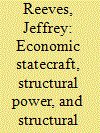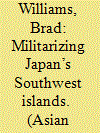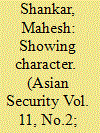| Srl | Item |
| 1 |
ID:
140773


|
|
|
|
|
| Summary/Abstract |
This article employs the concepts of structural power and structural violence to a undertake critical study of China’s use of economic statecraft toward Kyrgyzstan. The article argues that China’s reliance on economic exchange to secure its strategic ends in Kyrgyzstan has resulted in asymmetric economic exchange between the two states. Through this asymmetric exchange, China has gained influence over Kyrgyzstan’s domestic structures. Chinese structural power, in turn, contributes to violence across Kyrgyzstan’s structures of economy, environment, and society and within the country’s state-society relations. Structural violence within Kyrgyzstan also results in periphery instability and domestic insecurity for China. As such, the article argues that China’s use of economic statecraft to achieve its strategic aims in Kyrgyzstan is self-defeating.
|
|
|
|
|
|
|
|
|
|
|
|
|
|
|
|
| 2 |
ID:
140775


|
|
|
|
|
| Summary/Abstract |
This paper sheds light on a relatively underexplored aspect of Japan’s recent security changes by examining the subnational level where the impact has been far-reaching. It focuses on Japan’s maritime frontier zone: the Yaeyama Islands located at the southwestern end of the Japanese archipelago and administered as part of Okinawa Prefecture. It argues that while Yaeyama militarization has been primarily a national response to China’s portrayed assertiveness in the East China Sea, it has also been facilitated by the strategic actions of local political elites, in cooperation with sympathetic extra-local forces. Political elites from two islands, Yonaguni and Ishigaki, have been motivated primarily by diverging material and ideational factors. Yonaguni elites have viewed militarization largely through the prism of “compensation politics.” Their counterparts in Ishigaki have been driven by more ideological objectives, seeking militarization for deterrence purposes and otherwise transforming the island into a rightist breeding ground in defence of Japanese territory. Yaeyama militarization has not only diminished enthusiasm for seeking autonomy and enhancing economic security through microregional cooperation, but has also enhanced local-level insecurities while creating and exacerbating divisions.
|
|
|
|
|
|
|
|
|
|
|
|
|
|
|
|
| 3 |
ID:
140776


|
|
|
|
|
| Summary/Abstract |
Civil wars frequently end with the signature of a peace agreement, which often includes power-sharing provisions. While most research focuses on their provisions, little research has been done on the question of how the content of peace agreements affects the groups signing them. Instead, research commonly depicts the conflict parties as unitary actors. This study tries to fill this research gap by asking how the content and implementation of the Mindanao Final Agreement affected the cohesion of the Moro National Liberation Front (MNLF). The analysis concludes that the implementation of power sharing is decisive. The failed inclusion and the low implementation of economic and territorial provisions had major effects on the cohesion of the MNLF.
|
|
|
|
|
|
|
|
|
|
|
|
|
|
|
|
| 4 |
ID:
140772


|
|
|
|
|
| Summary/Abstract |
In the approach to the Sino-Indian war of 1962, the Indian government made some surprising policy choices. Most significant was Nehru’s decision to contest what was viewed by him and his officials as unimportant territory in the western sector, rejecting in the process Chou en-Lai’s 1960 “package” offer. Instead, Delhi chose to initiate in 1961 the Forward Policy, in full awareness of the severely disadvantageous position of the Indian military in the disputed border areas. Using Indian primary documents, this article makes the case that reputational considerations—particularly Nehru’s fear that any concessions to China would be viewed as weakness and provoke further aggression—help explain the puzzling aspects of India’s intransigence on the Sino-Indian territorial dispute during this period.
|
|
|
|
|
|
|
|
|
|
|
|
|
|
|
|